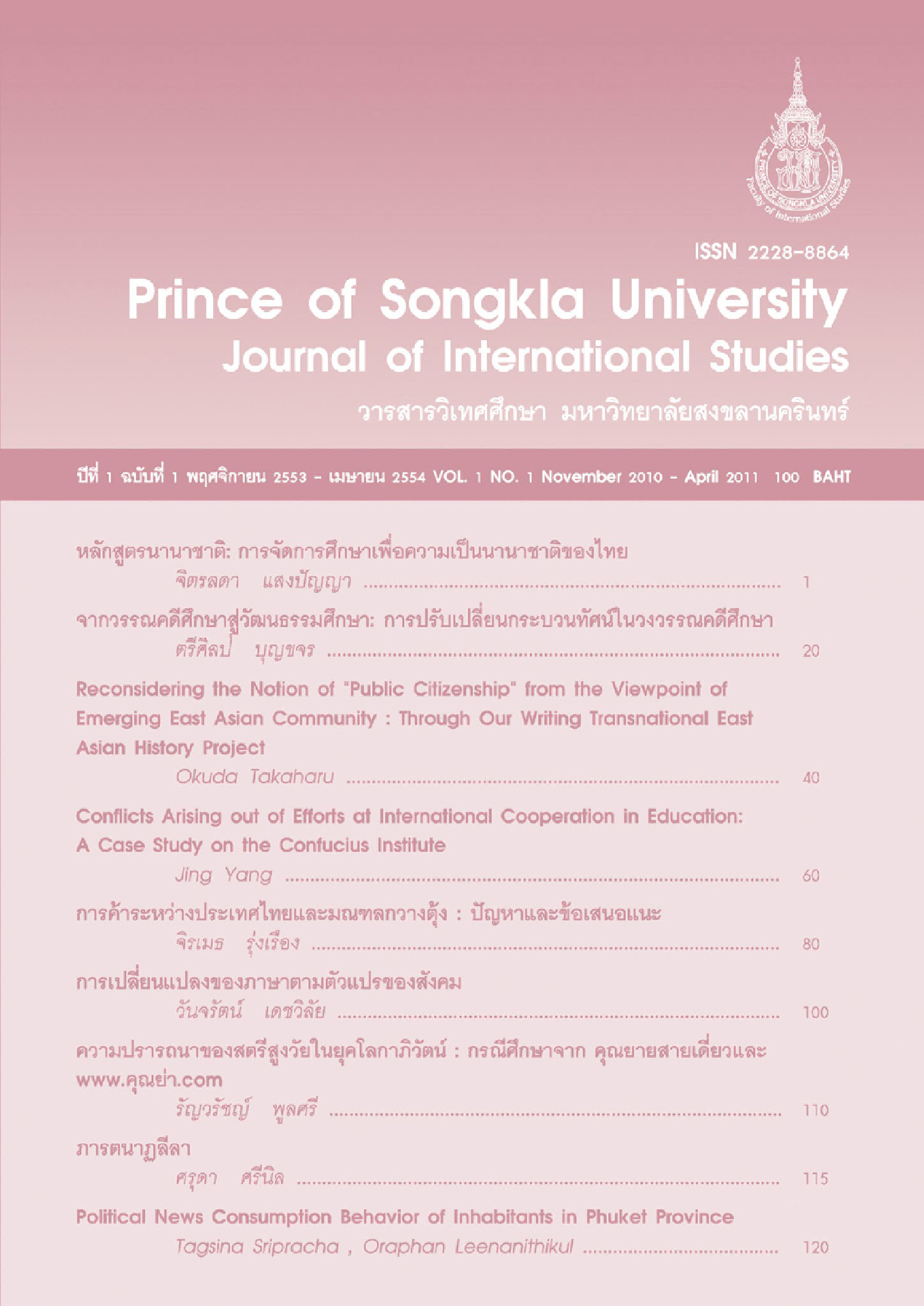The desire of elderly women in globalized age: Khun Yai Sai Diew and www.grandma.com
Main Article Content
Abstract
This article aims to study elderly women characters in order to analyse their desire, social status, myths, social standard and expectation in Khun-Yai-Sai-Diew and www.grandma.com. Developmental Psychology is used for explaining elderly women's characteristics and defining their mental and emotional problems under the term of globalized age. This study reveals that elderly women's desire is more complicated and they also have conflict between their own desire and social expectation. From both novels, elderly women characters can be classified into 3 types: first, those who wanted to escape social norms(but they failed), second, those who could escape but finally came back into social norms and the last, those who broke social norms definitely and were punished by the society
In conclusion, this study reveals that Thai society has still accepted the stereotyped elderly women. The stereotype of ideal elderly women is strong while the capitalism which is the part of globalization forces them to be modern and active. Elderly women have to depend on materialism and modernization because the stereotyped elderly women are considered not to be suitable for modern society. However, the rebellious , modern and active elderly women characters couldn't be accepted and were rejected from the society. This study reflects that Thai society accepts only the stereotyped elderly women, no matter how the society has been changed.
Article Details
Statements and opinions expressed in articles herein are those of the authors and do not necessarily reflect the position of the editors or publisher.
Article, information, text, image, etc. which are published in Journal of International Studies, belong to Journal of International Studies. If anybody or any organization would like to use part or whole of them, they must receive written permission from Journal of International Studies before usage.
References
บาร์ตส์ โรล็องด์ (2544) มายาคติ = Mythologies.กรุงเทพฯ: สํานักพิมพ์ คบไฟ
บุญเหลือ เทพยสุวรรณ, ม.ล. (2519) ความสุขของสตรีกรุงเทพฯ, สมาคมสุขภาพจิตแห่งประเทศไทย
พีรสิทธิ์ คํานวนศิลป์ (2523), ความทันสมัย ภาพพจน์เกี่ยวกับตนเอง และปัญหาบางประการของคนชรา.กรุงเทพฯ: สํานักวิจัย สถาบันบัณฑิตพัฒนบริหารศาสตร์.
วนิษา เรซ.อัจฉริยะสร้างสุข กรุงเทพฯ: ฐานการพิมพ์, 2552
ศรีเรือน แก้วกังวาน (2530), จิตวิทยาพัฒนาการ กรุงเทพฯ: ประกายพรึก
ศศิพัฒน์ ยอดเพชร (2541) การเกื้อหนุนทางสังคมแก่ผู้สูงอายุ พื้นที่ศึกษาในเขตภาคตะวันออกเฉียงเหนือ : รายงานการวิจัย / คณะผู้วิจัย.กรุงเทพฯ: กองบริหารงานวิจัย มหาวิทยาลัยมหิดล
ศิริวรรณ ศิริบุญ (2543) การตอบสนองต่อปัญหาและความต้องการของผู้สูงอายุ : ศึกษากรณีตัวอย่าง การจัดตั้งศูนย์บริการทางสังคมสําหรับผู้สูงอายุ กรุงเทพฯ: วิทยาลัยประชากรศาสตร์ จุฬาลงกรณ์มหาวิทยาลัย
สุชา จันทน์เอม (2527)เจิตวิทยาพัฒนาการ.กรุงเทพฯ: ไทยวัฒนาพานิช
Ann Bowling Maidenhead (2005). Ageing well : quality of life in old age .London: Open University Press.
Catherine Belsey (1994). Desire : love stories in Western culture. Oxford, UK: Blackwell.
Dan Baker,Ph.D, Cathey Greenberg, Ph.D, Ina Yalof (2007). What Happy Women Know .New York: St. Martin's Griffin.
Martin E.P.Seligman, Ph.D. (2002). Authentic Happiness. New York : A Division of Simon & Schuster,Inc.
Todd D. Nelson (2002). Ageism: stereotyping and prejudice against older persons. Cambridge: MIT Press


